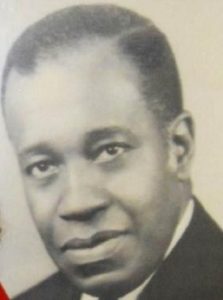
Elbert F. Cox
Elbert Cox was born on this date in 1895. He was a Black mathematician and educator.
Elbert Frank Cox was born in Evansville, Indiana; he was the oldest of three boys born to Johnson D. Cox, an elementary school principal, and his wife, Eugenia D. Cox. Close-knit and highly religious, the Cox family had a respect for learning that mirrored the father's educational career. Cox was directed toward Indiana University when he demonstrated high school mathematics and physics ability. While at Indiana, he was elected to undergraduate offices and joined the Kappa Alpha Phi fraternity.
After graduation in 1917, Cox entered the U. S. Army as a private during World War I and was promoted to staff sergeant in six months. Upon discharge, he became an instructor of mathematics at a high school in Henderson, Kentucky. In 1920 or 1921 (sources vary), Cox joined the faculty of Shaw University in Raleigh, North Carolina, and left there two years later to attend Cornell University with a full scholarship. In the summer of 1925, when Cox received his doctorate from Cornell, he became the first Black to earn a degree in pure mathematics, a field concerned with mathematical theory rather than practice or application.
The topic of Cox's dissertation concerned polynomial solutions of differential equations. In the fall of 1925, Cox became the head of the mathematics and physics department at West Virginia State College. He married Beulah P. Kaufman, an elementary school teacher, on September 14, 1927. They had three sons, James, Eugene, and Elbert. In 1929, he moved to Washington, D. C., to join the faculty of Howard University. In 1947, Cox became chair of Howard's mathematics department, a position he held until 1961 (a university rule mandated that all department heads resign at age 65). In addition to his contributions to abstract mathematics, he made his mark as an educator by helping craft Howard's grading system the year he joined their staff and advising numerous successful master's degree candidates in mathematics.
He remained a full professor in the department until his retirement in 1966. During his career, Cox specialized in difference equations, interpolation theory, and differential equations. His professional honors were memberships in such educational societies as Beta Kappa Chi, Pi Mu Epsilon, and Sigma Pi Sigma. He was also active in the American Mathematical Society, the American Physical Society, and the American Physics Institute. Cox died on November 28, 1969, after a brief illness.